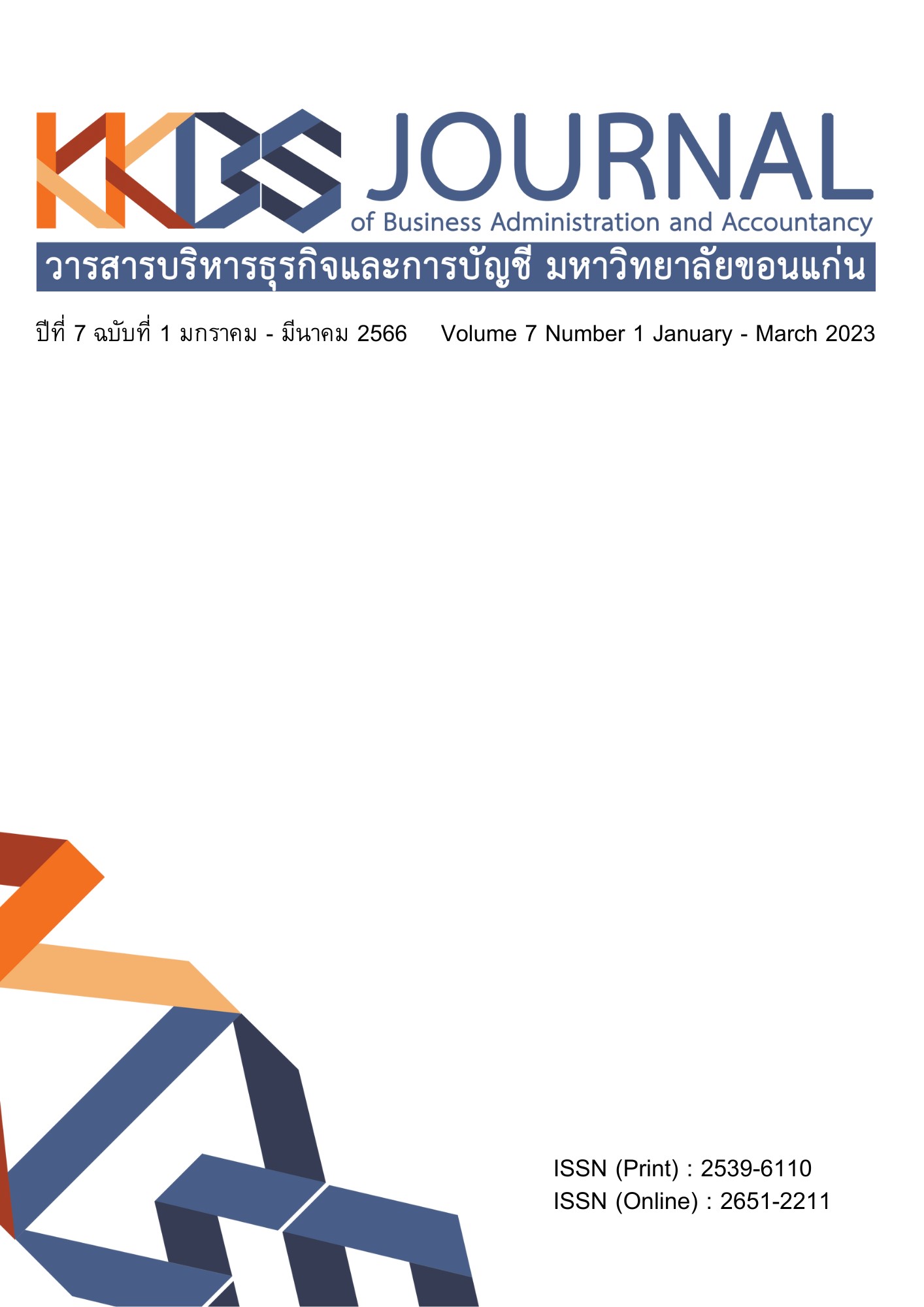Influence of Constructive Organizational Culture on the Innovative Work Performance of Salespersons: The Role of Behavior Control and Social Support
Main Article Content
Abstract
The purposes of this research were to study the Influence of Constructive Organizational Culture on the Innovative Work Performance of Salespersons: The role of Behavior Control and Social Support. The sample was 408 Thai sales operations who have been working in all Bangkok areas. The data was collected with an online questionnaire. The quantitative data were analyzed using descriptive statistics including frequency, percentage mean, and standard deviation. The data was analyzed using Enter Multiple Regression. The results of the study were the perceived constructive organizational cultures including tacit knowledge exchange and networking behaviors had a positive affecting the innovative work performance of salespersons. The research also found that the moderating role of perceived behavior control namely activity control and perceived social support namely perceived social support, organization support, and co-worker support affect the relationship between constructive organizational cultures on innovative work performance.
Article Details

This work is licensed under a Creative Commons Attribution-NonCommercial-NoDerivatives 4.0 International License.
The articles published in the journals are the authors' opinions, not the opinion of the editorial team or administrative staff. The articles published is copyright of the Journal of Business Administration and Accounting, Khon Kaen University.
References
Akçin, K., Erat, S., Alniaçik, Ü. & Çiftçioğlu, A.B. (2017). Effect of perceived organizational support on organizational silence and task performance: A study on academicians. Journal of Global Strategic Management, 11(1), 35-43.
Aletraris, L. (2010). How satisfied are they and why? A study of job satisfaction, job rewards, gender and temporary agency workers in Australia. Human Relations, 63(8), 1129-1155.
Anderson, E. & Oliver, R.L. (1987). Perspectives on behavior-based versus outcome-based salesforce control systems. Journal of Marketing, 51(4), 76-88.
Arkkaradate, M. (2018). Factors affecting performance efficiency among employees in machine installed production line, Songkhla. Suratthani Rajabhat Journal, 5(1), 95-121. (In Thai)
Banin, A.Y. et al. (2016). Salesperson improvisation: Antecedents, performance outcomes, and boundary conditions. Industrial Marketing Management, 59, 120-130.
Bonney, F.L. & Williams, B.C. (2009). From products to solutions: the role of salesperson opportunity recognition. European Journal of Marketing, 43(7-8), 1032-1052.
Cavusgil, S.T., Calantone, R.J. & Zhao, Y. (2003). Tacit knowledge transfer and firm innovation capability. Journal of Business & Industrial Marketing, 8(1), 6-12.
Challagalla, G.N. & Shervani, T.A. (1996). Dimensions and types of supervisory control: effects on salesperson performance and satisfaction. Journal of Marketing, 60(1), 89-105.
Charoensukmongkol, P. & Suthatorn, P. (2020). Linking improvisational behavior, adaptive selling behavior and sales performance. International Journal of Productivity and Performance Management, 70, 1582-1603.
Chen, Y.-C., Rivas, A.A. & Wu, W.Y. (2017). Exploring the determinants and consequences of salesperson market orientation behavior: An empirical study in the financial service industry. Journal of Service Theory and Practice, 28(2), 170-195.
Cochran, W.G. (1977). Sampling techniques. 3d ed. Wiley: New York.
Ferdinand, A.T. & Wahyuningsih, W. (2018). Salespeople's innovativeness: A driver of sales performance. Management & Marketing, 13(2), 966-984.
Forret, M.L., & Dougherty, T.W. (2001). Correlates of networking behavior for managerial and professional employees. Group & Organization Management, 26(3), 283-311.
Haber, D. (2013). Health promotion and aging: Practical applications for health professionals. 6th ed. New York: Springer.
Heinze, T., Shapira, P., Rogers, J. & Senker, J. (2009). Organizational and institutional influences on creativity in scientific research. Research Policy, 38, 610-623.
Ivanov, C.-I. & Avasilcăi, S. (2014). Performance measurement models: An analysis for measuring innovation processes performance. Procedia-Social and Behavioral Sciences, 124, 397-404.
Joshi, A. (2006). The influence of organizational demography on the external networking behavior of teams. Academy of Management Review, 31(3), 583-595.
Korkaew, J. (2016). Structural equation model of the relationship of behavior toward the polices’ performance in Southern Border Provinces of Thailand. Journal of Management Sciences, 33(1), 1-24. (In Thai)
Krush, M.T., Agnihotri, R., MacIntosh, G.M. & Kalra, A. (2017). Saleperson networking behavior and creativity: Exploring an unconventional relationship. Marketing Management Journal, 27(1), 31-47.
Mahaney, R.C. & Lederer, A.L. (2006). The effect of intrinsic and extrinsic rewards for developers on information systems project success. Project Management Journal, 37(4), 42-54.
Maher, L. (2010). Creating the culture for innovation: A practical guide for leaders. Conventry: NHS Institute for Innovation and Improvement.
Mansor, M.F. (2012). The effect of rewards towards job performance among chemical-based employees. International Journal of Business and Management Tomorrow, 2, 1-11.
Miao, C.F., Evans, K.R. & Shaoming, Z. (2007). The role of salesperson motivation in sales control systems: Intrinsic and extrinsic motivation revisited. Journal of Business Research, 60(5), 417-425.
Muzafarya, S.S., Alib, I. & Hussainc, M. (2021). Intrinsic rewards and employee creative performance: Moderating effects of job autonomy and proactive personality: A perspective of self-determination theory. International Journal of Innovation, 15(2), 701-725.
Peevara, P. (2021). Dimensions of innovative work behavior in digital transformation. KKBS JOURNAL of Business Administration and Accountancy, 5(3), 69-96. (In Thai)
Polanyi, M. (1998). Personal knowledge: Towards a post-critical philosophy. Chicago: University of Chicago Press.
Poots, A. & Cassidy, T. (2020). Academic expectation, self-compassion, psychological capital, social support and student wellbeing. International Journal of Educational Research, 99, 101506.
Rhoades, L. & Eisenberger, R. (2002). Perceived organizational support: A review of the literature. Journal of Applied psychology, 87(4), 698-714.
Subanidja, S. & Hadiwidjojo, D. (2017). The influence of knowledge management “bottleneck” on company’s performance. Management & Marketing, 12(3), 402-415.
Yanisa, P. (2019). Perceived organizational support and problem-solving performance: The moderator role of empowerment climate and psychological empowerment in Ban Wa (Hi-Tech) Industrial Estate Phra Nakhon Si Ayutthaya Province. Humanities, Social Sciences and Arts, 12(5), 283-303. (In Thai)


